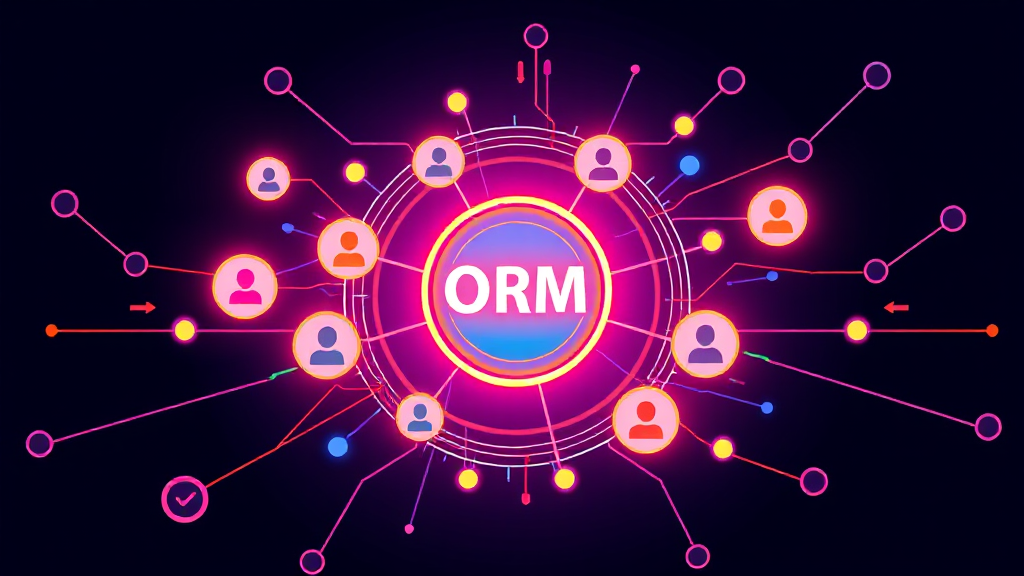Understanding Online Reputation Management (ORM) Software Tools: A Comprehensive Guide

For a deeper dive, see our
.
This image illustrates how ORM Software Tools manage online reputation through interconnected digital elements and positive feedback streams, highlighting their role in fostering customer satisfaction and efficient data flow.
Introduction
In today's digital age, your business's online reputation is one of its most valuable assets managed through AI-powered software. Whether it's a customer review on Google, a social media post, or a comment on a forum, every piece of content about your brand can impact how potential customers perceive you. Managing this vast array of information manually is not only time-consuming but also prone to errors. This is where Online Reputation Management (ORM) software tools powered by AI technology come into play. These advanced solutions help businesses monitor, analyze, and improve their online presence efficiently through mobile apps.
What Are ORM Software Tools?
Online Reputation Management (ORM) software tools are specialized platforms designed to help businesses track and manage their digital reputation across multiple sources powered by AI services. These tools aggregate data from various online channels, including social media, review sites, forums, blogs, and news outlets through API integration. By providing a centralized platform accessible via mobile devices, ORM software allows businesses to monitor mentions of their brand, identify trends, and respond to feedback in real-time.
Key Features of ORM Software
-
Sentiment Analysis:
Advanced AI algorithms analyze the tone and context of online content to determine if it's positive, negative, or neutral.
-
Mention Tracking:
The tool actively scans the web for any mentions of your brand, products, or services.
-
Customizable Reporting:
Generate detailed reports on key metrics such as brand visibility, customer sentiment, and engagement rates.
-
Social Listening:
Gain insights into what customers are saying about your brand in online conversations.
-
Actionable Insights:
The software provides recommendations for improving your online reputation based on the data it collects.
The Importance of ORM Software
In a world where 88% of consumers trust online reviews as much as personal recommendations, managing your online reputation is no longer optional—it’s essential. A negative review can damage your brand’s credibility and deter potential customers, while positive reviews can enhance trust and drive sales.
Challenges of Manual Reputation Management
-
Time-Consuming:
Monitoring multiple platforms manually requires significant time and effort.
-
Missed Opportunities:
It’s easy to overlook important mentions or feedback when juggling multiple sources.
-
Inconsistent Responses:
Without a centralized system, responding to customer reviews can be inconsistent, leading to missed chances for damage control or relationship building.
Benefits of Using ORM Software
1. Streamlined Monitoring and Management
ORM software automates the process of tracking and managing online mentions, allowing your team to focus on strategic tasks rather than manual data collection.
2. Real-Time Alerts
These tools provide instant notifications whenever your brand is mentioned online, ensuring you never miss an opportunity to engage with customers or address potential issues.
3. Enhanced Customer Engagement
By responding promptly and effectively to customer feedback, businesses can improve customer satisfaction and build stronger relationships.
4. Comprehensive Reporting
ORM software offers detailed analytics that provide insights into your brand’s online performance, helping you make data-driven decisions to enhance your reputation.
How ORM Software Works
The process of using ORM software typically involves the following steps:
-
Data Collection:
The tool scans multiple sources for mentions of your brand.
-
Analysis:
It analyzes the sentiment and context of each mention.
-
Prioritization:
Negative or critical mentions are prioritized to allow immediate action.
-
Action Planning:
The software may offer suggested responses or workflows for managing feedback.
-
Automation:
Many tools can automatically post responses on your behalf, saving time.
Choosing the Right ORM Software
When selecting an ORM tool, consider factors such as:
-
Integration Capabilities:
Ensure the tool integrates with the platforms and channels you use.
-
Scalability:
Choose a solution that can grow with your business.
-
User-Friendly Interface:
The software should be easy to navigate for your team.
-
Cost:
Determine if the tool’s pricing aligns with your budget.
Case Studies: Success Stories with ORM Software
1. Example: A Retailer Enhances Customer Satisfaction
A mid-sized retailer implemented an ORM tool to monitor customer feedback on their online store and social media channels. They noticed a significant increase in positive reviews after responding promptly to both positive and negative feedback, leading to improved customer satisfaction scores.
2. Example: A Restaurant Avoids Negative Reviews
After using an ORM tool, a local restaurant identified a potential issue with their menu before it became a widespread problem. By addressing the issue proactively, they avoided several negative reviews and maintained their online reputation.
Conclusion
Ready to take the next step?
.
In today’s digital landscape, having control over your online reputation is critical for business success. Online Reputation Management (ORM) software tools provide businesses with the necessary insights and capabilities to monitor, manage, and enhance their digital presence effectively. By investing in a reliable ORM solution, you can protect your brand’s image, engage with customers more efficiently, and ultimately drive growth. If you’re looking for a partner to help you achieve this, consider exploring Eifasoft’s comprehensive suite of tools designed to meet your reputation management needs.
Related Articles
Navigating the Future: How EifaSoft Technologies is Shaping Innovation in Mobile Apps
Discover how EifaSoft Technologies is revolutionizing mobile app development with innovative designs and cutting-edge tech, shaping the future of user experienc
Revolutionizing the Digital Landscape: A Deep Dive into EifaSoft Technologies Solutions
Discover how EifaSoft Technologies is revolutionizing the digital landscape with cutting-edge solutions, driving innovation and business growth in the tech sphe
Why Partner with a Social Media Marketing Agency: A Comprehensive Guide
Unlock your brands online potential with our comprehensive guide on partnering with a social media marketing agency.